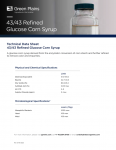UK's move to fortify flour with folic acid to help prevent birth defects hailed

Commenting on the announcement, Gordon Polson, CEO of the Federation of Bakers, said, “The decision to mandatory add folic acid to non-wholemeal wheat flour is welcomed by our members. Bread is already a major contributor to the healthy diet of the nation and an important source of carbohydrate, fibre and a wide range of nutrients, including calcium, iron and B vitamins.
“The FOB has consistently said that the fortification of flour is a medical decision and as an industry we have always been responsive to what is in the best interests of consumers. Our members therefore remain committed to responding positively to this announcement and look forward to working with government on the details of adding folic acid to non-wholemeal flour.”
The UK government is aiming to actively avoid around 200 birth defects in the UK each year by adding folic acid to products made with flour, like bread, pasta and bakes.
The move plays catchup with global standards. More than 80 countries already fortify flour with the B nutrient. In fact, it’s proven to be a highly successful public health policy in Australia, which has recorded a 15% decrease in neural tube defects.
In the UK, however, it’s taken years to reach this decision.
Previous concerns of unintended health effects, such as masking a vitamin B12 deficiency or the increasing the risk of colon cancer, caused prolong debate over the gains versus the harms. But following extensive consultations with both industry and public stakeholders, the Scientific Advisory Committee on Nutrition is now satisfied these are not supported and that birth defects are a greater concern.
Neural tube defects, such as spina bifida (abnormal development of the spine) and anencephaly (a life-limiting condition that affects the brain) occur in about 1,000 pregnancies per year in the UK. While many babies diagnosed with spina bifida survive into adulthood, they will experience lifelong impairment.
Doctors advise women to take 400mg of folic acid a day for at least a month before conception and up to the 12th week of pregnancy. But, with more than half of pregnancies being unplanned and most women forgetting or not aware of the importance of folic acid, birth defects across the nation is still uncomfortably unnecessary.
‘Extra piece of mind’
The addition of folic acid will not be a major change for the public as the country has a long history of flour fortification. Since WWII, the nation’s non-wholemeal flour has been fortified with iron, calcium and two other B vitamins (thiamin and niacin).
Folic acid is already voluntarily added by breakfast cereal producers, as well as some gluten-free products.
Folate (Vitamin B9) helps the body make healthy red blood cells and is naturally occurring in certain foods, such as leafy green vegetables. Folic acid is the synthetic (man-made) form of folate.
With over 99% of British households purchasing bread and more than a quarter of all groceries containing flour, adding folic acid to flour-based products a simple way to increase folate levels for tens of millions of Brits.
“Few things are as important as a baby’s health – and folic acid-fortified flour is a quick, simple win to enhance their development,” said UK Prime Minister Boris Johnson.
“This will give extra peace of mind to parents and families, as well as helping boost the health of adults across the country.”
Health and Social Care Secretary Sajid Javid, added, “We are committed to giving more children a healthy start in life. With the safe and taste-free folic acid baked into the national diet, hundreds more babies will be born healthy each year.
“Focusing on preventing life-threatening health issues such as spina bifida, will ensure fewer people will require hospital treatment, and more individuals and families are able to live healthier lives.”
Seamless implementation
The government also claims the costs of the adding folic acid are expected to be minimal and will not require a major overhaul for industrial-scale flour producers. It will only apply to non-wholemeal wheat flour, with gluten-free foods and wholemeal flour exempt. Wholemeal flour has more naturally occurring folate than non-wholemeal wheat flour, and some gluten-free foods are already fortified with the nutrient.
“Flour, whether white brown or wholemeal, is an ingredient in many foodstuffs and supplies a big proportion of our daily fibre and protein along with essential nutrients such as calcium, iron and B vitamins,” said Alex Waugh, director of UK Flour Millers.
“If it is decided that folic acid should be added to flour for public health reasons, flour millers will do all they can to overcome any practical challenges to make it happen.”
Kate Steele, CEO of Shine, said the charity – which provides specialist support for people whose lives have been affected by spina bifida and hydrocephalus – is delighted by the government’s decision, a move it has campaigned for over 30 years.
“Mandatory fortification of flour with folic acid will improve public health for so many, now and in the future.
“In its simplest terms, the step will reduce the numbers of families who face the devastating news that their baby has anencephaly and will not survive. It will also prevent some babies being affected by spina bifida, which can result in complex physical impairments and poor health. This is truly a momentous day,” said Steele.

















